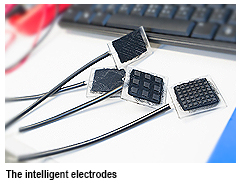CityU’s intelligent clothing tracks abnormal heart conditions
A new type of intelligent clothing developed by City University of Hong Kong (CityU) helps medical professionals fight heart disease.
Dr Raymond Lam Hiu-wai, Assistant Professor in CityU’s Department of Mechanical and Biomedical Engineering, has developed a new type of intelligent electrode in the form of tight-fitting clothing that remotely monitors and records the heart conditions of patients.
The new technology has been achieved by enhancing the electrodes on the electrocardiogram (ECG), and it is particularly useful for elderly people suffering from coronary heart disease who are living alone.
The ECG is commonly used for the diagnosis of heart disease. The diagram drawn to reflect the changes of electrical activity recorded from various parts of cardiac tissue by using microelectrode technology is what we call the ECG.
Typically, medical professionals check the ECG of patients with coronary heart disease who are sent to hospitals when unwell. However, if the patients are in a coma and unable to describe their conditions, the risk of death rises because doctors need more time to formulate a diagnosis.
Made of ordinary fabric, the intelligent clothing invented by Dr Lam and his research team is washable and can absorb perspiration and conserve body heat, the same as any underwear. The only difference is that the clothing has a total of 10 small bags attached at such positions as the two shoulders, the chest and waist. Inside each bag is a silicon electrode connected to a blue-tooth transmitter and a battery-powered ECG machine. The device is small enough to be carried around the waist.
Like an ECG, Dr Lam’s specially designed clothing uses electrodes to pick up electrical impulses from various parts of a patient’s body. The data are transmitted by blue-tooth technology to the patient’s home computer and servers at hospitals for medical professionals to access and interpret.
“The information collected and transmitted by the electrode tight-fitting clothing enables medical professionals to constantly monitor the heart activity of patients. When abnormalities are found, treatment is arranged as early as possible. The data are stored on computers at hospitals, significantly shortening the time for diagnosis and referrals to other units,” Dr Lam said.
He added that the electrode tight-fitting clothing is particularly suitable for elderly people with coronary heart disease who are living alone as it can be worn for a long period of time. Some non-government organisations have already indicated their interest in inviting senior citizens to try out the special clothing.
One of the innovations in the project was using micro-processing technology to produce micro-structured silicon electrodes that are not affected by an external force, such as the movement of patients’ body.
Further innovations include improving the system so that it will automatically issue warning signals when abnormal heart readings are received.


